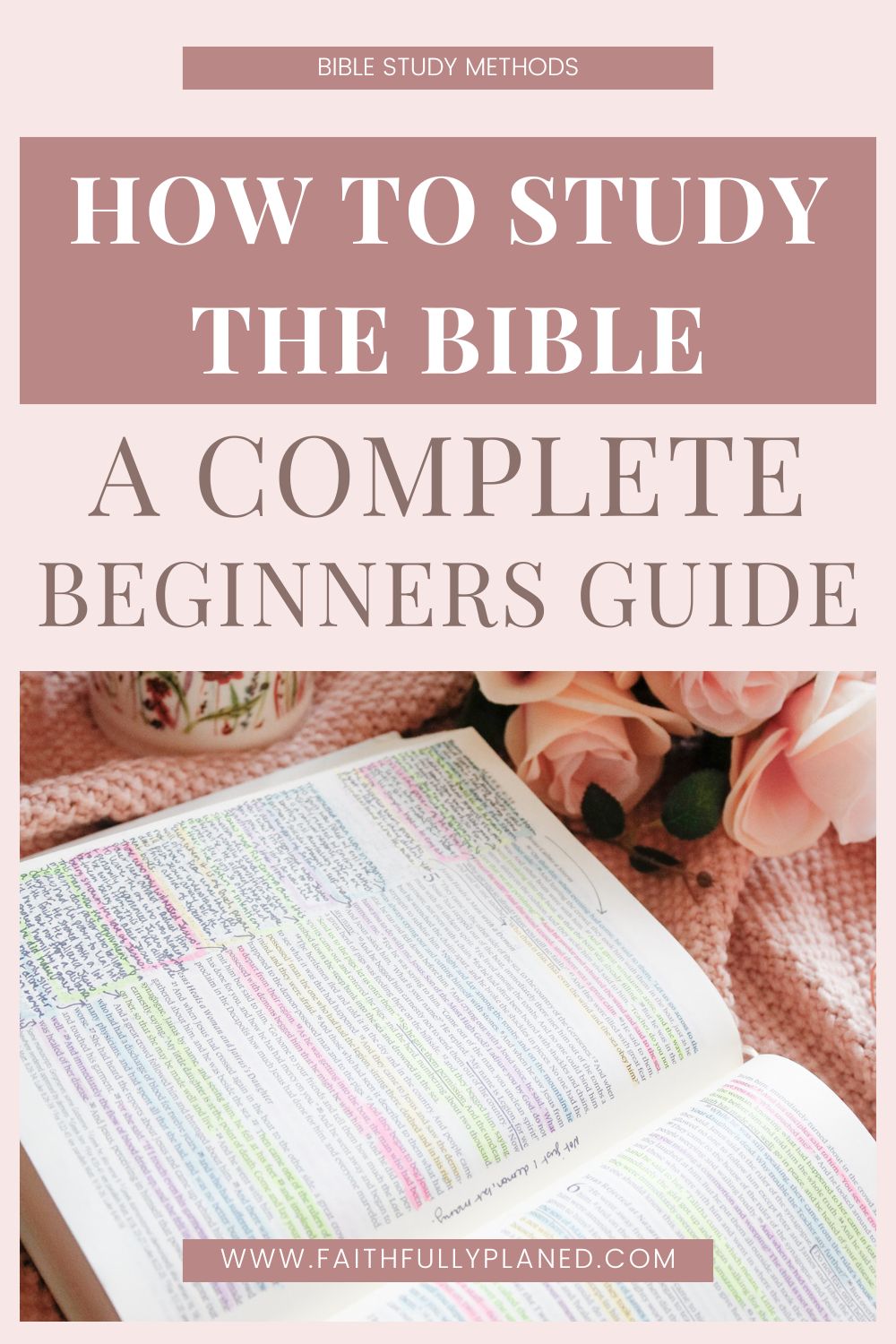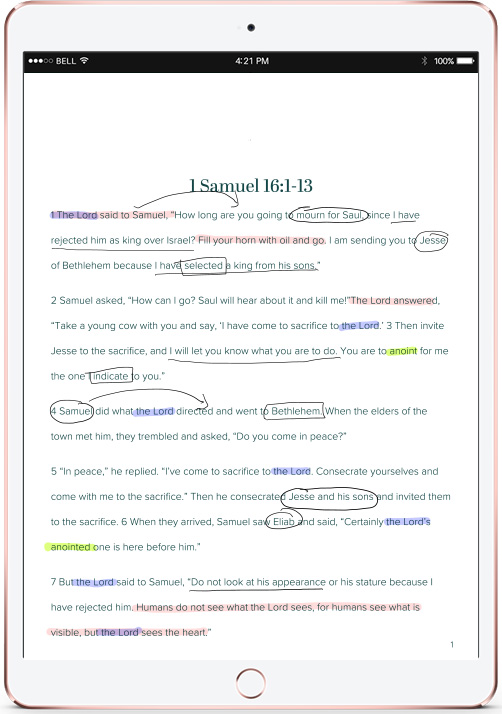How to Study The Bible: An In-Depth Step-by-Step Guide for Beginners

Are you eager to study the Bible but don’t know where to start?
Studying the Bible is one of the most transformative things you can do for your spiritual growth, but let’s be honest—it can feel overwhelming at first.
How do you choose a translation? What tools should you use? How do you ensure you’re truly understanding Scripture and not just reading it at surface level?
This guide will walk you through how to study the Bible step by step—giving you the confidence, tools, and structure you need to engage with God’s Word deeply and effectively.
What You’ll Learn in This Guide:
- Why studying the Bible matters
- Essential tools for Bible study
- Practical methods to help you understand Scripture
- How to apply what you learn to your daily life
Let’s get started.
What is the Bible?
The Bible is God’s Word, written for us. It is a collection of 66 books, written by over 40 authors across 1,500 years, yet it tells one cohesive story—God’s plan of redemption through Jesus Christ.
It includes:
- Historical narratives (Genesis, Exodus, Acts)
- Wisdom literature (Psalms, Proverbs)
- Prophecy (Isaiah, Revelation)
- The Gospels (Matthew, Mark, Luke, John)
- Letters to the early church (Romans, Ephesians, Philippians)
2 Timothy 3:16-17 reminds us:
“All Scripture is breathed out by God and profitable for teaching, for reproof, for correction, and for training in righteousness, that the man of God may be complete, equipped for every good work.”
Even though the Bible was written in different languages, cultures, and time periods, it remains unified, timeless, and relevant for our lives today.
The Bible is God’s way of teaching us about who He is and how He wants us to live.
God’s Word is God himself.
John 1:1-5 (emphasis mine) tells us this.
“In the beginning was the Word, and the Word was with God, and the Word was God. He was in the beginning with God. All things were made through him, and without him was not anything made that was made. In him was life, and the life was the light of men. The light shines in the darkness, and the darkness has not overcome it.”
God’s Word has always existed because God’s word is God. To study it is to study the God of the universe.
Why Do We Need to Know How to Study the Bible?
Many people read the Bible, but few truly study it—and there’s a big difference.
1. God Commands Us to Know His Word
In Deuteronomy 6:4-9, God tells His people to:
- Keep His Word in their hearts
- Teach it diligently to their children
- Surround themselves with Scripture in their daily lives
The same applies to us today. We are called to know, apply, and share God’s Word with others.
2. Studying Scripture Deepens Our Relationship with Jesus
You cannot follow Jesus without knowing Him, and you cannot fully know Him without knowing Scripture.
Jen Wilkin says it well:
“The heart cannot love what the mind does not know.”
If we want to grow in our faith, we must be intentional about learning who God is through His Word.
3. The Bible Equips Us for Life
- It reminds us of truth in a world full of deception.
- It strengthens our faith when we feel weak.
- It guides our decisions and actions.
R.C. Sproul puts it this way:
“The Christian who is not diligently involved in a serious study of Scripture is simply inadequate as a disciple of Christ.”
Bible study isn’t just an academic exercise—it’s an invitation into deeper intimacy with God.

Before You Begin: Essential Bible Study Tools
1. A Bible
The first thing you’ll need to study the Bible is a Bible!
The blessing and the curse of this is that there are so many different Bibles for you to choose from. Before you choose a Bible, do some research and choose a translation. This matters more than the cover or type of Bible.
Your Bible translation matters because it affects how you understand Scripture. Some translations prioritize word-for-word accuracy, while others focus on thought-for-thought readability.
Examples of word-for-word translations are:
- ESV
- NASB
- KJV
- The Amplified Bible
Examples of thought-for-thought translations are:
- NIV
- NLT
- CSB
- NRSV
There are also paraphrases, such as the Message or Passion translations. I do not recommend these translations for personal BIble study.
My personal Bible is an ESV Single Column Journaling Bible, and it is my absolute favorite BIble to study with.
There are Bibles to suit any interest, from different translations to different styles and features. You can also access many translations of the Bible online for free.
However, I would encourage all Christians to have at least one physical Bible that they use for personal study and reference.
2 A Study Bible
The next tool I recommend is a reputable study Bible in another translation. I highly encourage you to study your Bible in multiple translations. It is beneficial to have a main Bible in one and a study Bible in another.
A Study Bible provides:
- Contextual notes
- Cross-references
- Historical insights
- Character Notes
- Maps
- Books Summaries
Recommended:
3. A Journal or Notebook
While I write notes directly in my journaling Bible, I tend to run out of room or need more space to dig into my thoughts.
Writing down your thoughts helps you process what you’re learning and retain what God is teaching you.
Consider using a Bible journaling notebook, like the Dwell In The Word Journal from The Daily Grace Co
4. Pens and Highligthers
If you’re going to write in a journal or directly in your Bible, you need something to write with.
I recommend Sharpie or Micron pens for the delicate pages of your Bible because they tend to bleed less, but use any pens you love for regular notebooks and journals.
For highlighters, I recommend the gel Bible highlighters from The Daily Grace, Co. I’ve had mine for years, and they are still going strong.
Plus, the set is often on sale for only $5!
5. Extrabiblical Study Resources
To find much of the information we discuss in this guide to studying the Bible, you will need outside help.
Of course, you will find a lot in the Bible itself, but to go deeper into history and culture and language, a good Bible dictionary, concordance, and commentary will be invaluable.
These resources include:
- Language and translation notes
- Definitions of common Biblical words
- maps and charts
- Cross-references
- Historical and cultural information
Here are some great options:
The New Treasury of Scripture Knowledge by Thomas Nelson
Eerdmans Dictionary of the Bible by David Noel Freedman
Holman Illustrated Bible Dictionary by Chad Brand & Eric Mitchell
Strong’s Concordance (Updated) by James Strong
NIV Exhaustive BIble Concordance by John Kohlenberg
How to Read The Bible Book-by-Book by Fee & Stuart is a great example of an all-in-one commentary
You can find all of our recommended Bible study resources on this page.
Bible Study Tip
Commentaries are wonderful resources where another educated scholar has done the work of interpreting Scripture and teaching it to us. These resources can clear up confusion and answer questions that come up during our study. Be sure to wait until the very end of your study to consult these resources.
How to Study the Bible: Background Research
Now that you have your tools, let’s walk through a practical study method that works for beginners and seasoned believers alike.
Step 0: Begin With Prayer
To have a solid Bible study session, prayer is essential.
Reading your Bible is reading God’s Word. He is speaking through Scripture and prayer postures your heart to hear from Him as you read.
Pray that:
- Your heart receives what God has for you to learn.
- You understand as you read.
- You are convicted as you understand.
- God speaks to you very clearly as you study.
Step 1: Choose a Book of the Bible
While there are many different methods of Bible study (i.e., chronological, character, topical, verse-mapping, etc.), the best way to read for comprehension and understanding is to choose a book and study it.
Rather than jumping around, start with one book and study it from beginning to end.
If you’re new to Bible study, start with:
- Matthew – The life of Jesus
- John – A deep, theological Gospel
- Ephesians – A short but powerful letter on Christian identity
- Philippians – A book about joy and perseverance
Step 2: Read The Envelope
Reading the envelope refers to what you would do when you receive a letter in the mail. Before you open the mail piece to read it, you gather as much information about its contents as you can from the outside.
We need to do the same with Scripture. Before beginning a book study, gather as much information about the book as you can.
- Who wrote it?
- To whom was it written?
- When was it written?
- What type of book is it? (Ex. Historical narrative? Poetry? Gospel? Epistle? Law?)
- What are the central themes?
Most of this information will be readily available for you if you have a solid study Bible, as mentioned above.
At the beginning of each chapter, read through the summary, including:
- the author,
- characters,
- locations,
- time period,
- themes, and more.
How to Study The Bible: The Inductive Method
Now, you are ready to start digging into your passage!
The method I will be teaching you to study your Bible with is called the inductive method. I will provide an overview of this method here, but you can dig deeper into inductive Bible study in this comprehensive guide I wrote here.
This Bible study method follows 3 basic steps:
Observe, Interpret, and Apply.
You can follow these steps to study any passage in the Bible, but I recommend studying individual books from beginning to end. Once you understand how to study a book in its entirety, you can utilize other methods, such as character studies or topical studies.
Read through the entire chapter at least once, ideally twice, before you begin doing any digging or marking. You may not get through all of the verses in the chapter with this method, but it is important to read it once before you start working through the text.
Reading through the entire chapter before you study gives you a base understanding of what is happening, allowing you to go deeper as you study back through it a second time.
Step 1: Observe
Most people overcomplicate their Bible study. This step brings simplicity and clarity as well as anchoring you in what the text is saying rather than jumping straight to what it means.
Very simply, what is in the passage you are reading?
Answer these questions as you read:
- Who is in the passage? Who is speaking or narrating? How are they described?
- Where are they? What is their location? Are they traveling?
- What are they doing?
- When? Make a note of the timeframe.
- Why? Is there a reason these events are happening? A reason why the person is speaking on that topic?
As you read, note any words that you cannot define in your own words and look them up. Be sure you understand the meaning of the words you are reading.
This is where you can utilize one of the Bible dictionaries listed in the tools section above.
As you are reading, look out for:
- Sentence structure
- Verb tense
- Repetition of words or phrases
- Instances where God speaks audibly
- Cross-references
Annotate The Text

Annotation is a main component of inductive Bible study. This is where a journaling Bible or a printed, double-spaced copy of the text will come in handy.
If you do not want to write in the pages of your Bible, use a free online Bible like biblegateway.com and copy/paste your passage into Word or Google Docs. Double-space the page and print!
<– See my example of 1 Samuel.
It is well-documented that interacting in some way with what you are learning will make it more likely to “stick” in your memory.
As you are making observations, physically make notes on the page. Highlight, circle, underline, draw boxes, etc., as you note these things:
- Repeated words or phrases
- Themes
- People
- Locations
- Transition words (ex. therefore, then, because, if, etc.)
- Lists
- Comparisons
- Commands
- Words you don’t know
- Questions that come up
Ask Questions
Don’t be afraid to ask God questions as you are studying. Be honest about the things that don’t make sense. Write them down, note them in your Bible, pray, and meditate on them as you go about your day.
All your questions may not be answered during your study, but answers may come later with further study or during a conversation with others.
Answers will likely come when you consult your study Bible and commentaries at the end of your study time, but if you are left with unanswered questions, that is okay. These questions are great to bring up with mentors, small group leaders, or your pastor if you need further guidance.
Step 2: Interpret
Good Bible study requires two things: humility and curiosity.
We should not open our Bibles determined to prove our own points. We open the Bible to learn what God has to say.
Just like a historian or a literary scholar, students of Scripture are tasked with uncovering the author’s intended original meaning.
Good study of Scripture requires us to be careful not to step into interpretation too early. You should spend the majority of your Bible study time on the observation step.
You may be asking, why do I need to do all this work? can’t I just read the plain text? Absolutely, you can.
But reading at the surface level will give you only surface-level understanding. Shallow understanding can create a shallow-rooted faith that can be easily uprooted by the storms of this life.
To go deeper in your study of Scripture is to go deeper in your relationship with Jesus.
Put it in context
To truly understand Scripture, we need to consider context—the surrounding information that gives meaning to a passage.
There are three key types of context:
- Historical/Cultural Context – What was happening at the time this was written?
- Literary Context – What type of writing is this, and how does it fit within the book?
- Biblical/Theological Context – How does this passage connect to the overall story of Scripture?
Let’s break these down.
Historical/Cultural Context
The historical context helps us understand what was happening in the world when and where a particular book was written.
- Who was the original audience?
- What major events were shaping their culture?
- Why was this book or letter written?
For example, when studying Ephesians, it’s important to know what was happening in first-century Ephesus—a city known for its pagan worship and spiritual warfare. This cultural backdrop helps us grasp why Paul emphasized spiritual armor (Ephesians 6) and warned against idolatry.
Context matters. It keeps us from misunderstanding or misapplying Scripture.
Literary Context
Just like today, the genre of a book affects how we read it. The Bible contains different types of writing, each with its own style and purpose.
- Old Testament: Narrative, Law, Poetry, Prophecy, Wisdom
- New Testament: Gospels, History, Letters (Epistles), Apocalyptic
The way we interpret Psalms (poetry) is very different from how we interpret Romans (a letter of doctrine). Poetry uses metaphor and symbolism, while letters often give clear instructions.
Understanding literary context also means looking at how a verse fits within its chapter, book, and the Bible as a whole.
Many misinterpretations come from taking verses out of context—reading them in isolation rather than within the full story. Scripture is meant to be understood within the surrounding passage and the larger biblical narrative.
Biblical/Theological Context
This type of context helps us see how a passage fits into the entire Bible.
- How does this passage connect to the rest of Scripture?
- How does it point to Jesus and God’s redemption plan?
The Bible is not a random collection of books—it tells one unified story of God’s plan to redeem humanity. The Old Testament lays the foundation, the New Testament fulfills it in Christ, and Revelation reveals the final restoration.
For example, when Jesus says in John 3:14, “Just as Moses lifted up the snake in the wilderness, so the Son of Man must be lifted up,” He’s referencing Numbers 21, showing how Old Testament events foreshadow Him.
The Bible builds upon itself, so understanding the bigger picture helps us interpret each passage accurately.
Exercises for Interpretation
1. Paraphrasing the Text
One of the best ways to understand Scripture is to rewrite it in your own words.
This practice helps strengthen your ability to interpret and internalize Scripture.
Try summarizing a passage as if you were explaining it to a friend. Don’t worry about getting it perfect—just focus on capturing the meaning.
2. Ask Key Questions of the Text
Digging deeper into Scripture means asking thoughtful questions. As you read, consider:
- Why did the author choose this word?
- Why did the author not say _______ instead?
- Why did God use this particular person?
- Why did this event happen at this time?
- What is the meaning of this word or phrase?
- What is the main point of this passage?
- What did the characters learn in this passage?
- How does this passage connect to the rest of Scripture?
By slowing down and asking these types of questions, you will begin to uncover deeper layers of meaning in God’s Word.
Tips For Sound Interpretation
#1 Scripture Interprets Scripture
When a passage seems unclear, look at other parts of the Bible that address the same theme.
The Bible is cohesive and self-explanatory, so always seek cross-references for deeper understanding.Where the BIble is unclear, we defer to where it is clear.
Never base a belief on a single vague verse when there are clearer ones that provide context.
#2 We interpret Scripture within the scope of the WHOLE Bible.
No single verse negates the overarching themes of Scripture.
Many books of the Bible were written to specific groups dealing with specific issues—so we must interpret them in light of the entire biblical message.
A passage should always align with the character of God and His redemptive plan.
Consult Your Resources
The last step in interpretation is to consult your resources.
This is where you should begin looking at commentaries and notes from other Bible teachers. (Note: This step is optional. You do not need to consult anyone else unless you have questions or need things clarified.)
Once you’ve observed and interpreted the passage for yourself, it’s helpful to check outside resources for deeper insights.
This can include:
- Commentaries (for scholarly interpretations)
- Podcasts
- Blogs or articles
- Sermons
Why wait until last? Because it’s important to let Scripture speak to you first before relying on someone else’s interpretation.
Step 3: Apply
This is where Scripture moves from knowledge to transformation.
The goal of Bible study isn’t just to understand what God’s Word says but to let it shape our lives.
Ask Yourself These Application Questions:
- What is God saying to me through this passage?
- What has this passage taught me about God’s character?
- How does this passage call me to live?
- Is there a command here I need to obey?
- Are there any promises here for me to cling to?
- How does this passage change my actions or character?
- How does this passage impact my relationships? (marriage, friendships, family, etc.)
- Is there an attitude or behavior I need to adjust?
- Is there something specific I should pray for?
Applying Scripture isn’t about perfection—it’s about progress and transformation. Even small steps of obedience draw you closer to Christ.
Step Four: Share
When God teaches you something through your Bible study, sharing it with others adds another deep layer to your learning.
One of the best ways to solidify what you’ve learned is to teach it to someone else.
- If a passage impacts you, share it with a friend.
- If your small group leader asks for insights, speak up.
- If you feel led, post about it on social media.
You never know who might be encouraged by what God is teaching you. Sharing your Bible study takeaways doesn’t just help others—it also deepens your own understanding.
Your Next Step: Establish a Consistent Bible Study Routine
Now that you know how to study the Bible, you can incorporate a consistent study routine into your life.
Daily Bible study is ideal, but not everyone’s life allows for this deep kind of study to happen every day. That is okay.
I teach a system of creating a Bible study routine that works for all lifestyles and you can dive deeper into that in this blog post.
I pray this guide blesses you and ignites your passion for Bible study. Go open those Bibles!
Your Sister In Christ,

P.S. If this post blessed you, would you share it with a friend?
Resources for Deeper Bible Study Learning
Knowing Scripture by R.C. Sproul
How to Read the Bible for All Its Worth by Fee & Stuart
Women Of The Word by Jen Wilkin
The Drama of Scripture by Craig Bartholomew & Michael Goheen
Search The Word Bible Study Workbook by The Daily Grace, Co.







Ashley, your guide on ‘How to Study The Bible: An In-Depth Step-by-Step Guide for Beginners’ is nothing short of a treasure trove for anyone seeking a deeper understanding of the Bible. Your comprehensive approach, starting from the fundamental question of ‘What is the Bible?’ to establishing a consistent Bible study routine, is both insightful and enlightening. I am particularly impressed by how you’ve woven the scriptures into the fabric of this guide, making it not just informative but spiritually enriching. The way you’ve broken down the complex process into manageable steps shows your deep understanding and respect for the Word. This guide is not only a tool for beginners but also a refreshing perspective for seasoned readers of the Bible. Your passion for sharing the Word and enabling others to dive deeper into their faith journey shines through every word. Thank you for creating such a valuable resource! Blessings, Paul.
I have been looking for a great beginners guide and I found it. The level of detail you go into is great and very helpful for bringing life to our understanding of the WORD. The way you have broken it down into simple and easy to understand sections makes this ideal for anyone wanting to start studying the Bible or return to regular study…thank you so much for this.